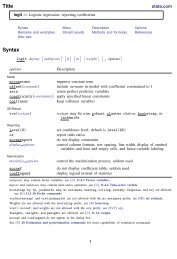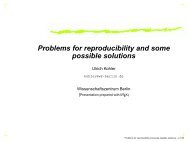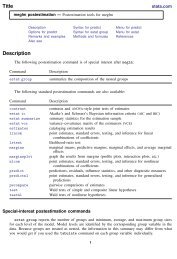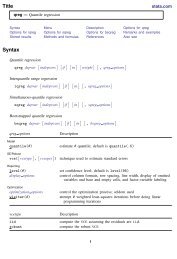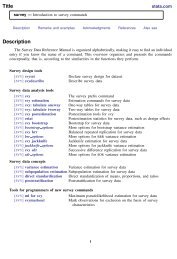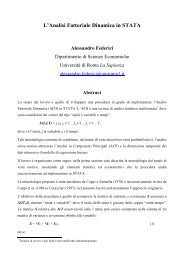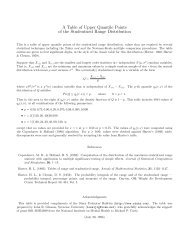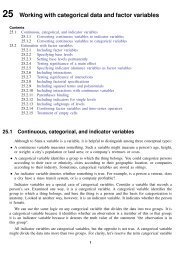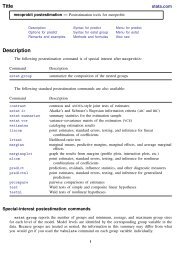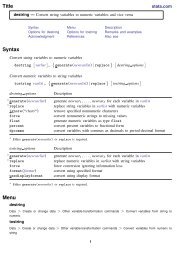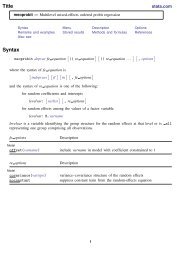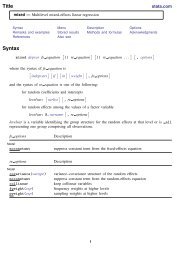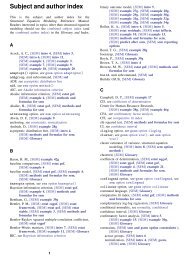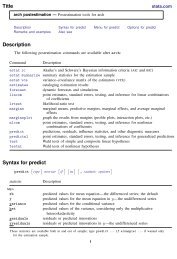xtlogit - Stata
xtlogit - Stata
xtlogit - Stata
You also want an ePaper? Increase the reach of your titles
YUMPU automatically turns print PDFs into web optimized ePapers that Google loves.
<strong>xtlogit</strong> — Fixed-effects, random-effects, and population-averaged logit models 5<br />
A panel variable must be specified. For <strong>xtlogit</strong>, pa, correlation structures other than exchangeable and independent<br />
require that a time variable also be specified. Use xtset; see [XT] xtset.<br />
indepvars may contain factor variables; see [U] 11.4.3 Factor variables.<br />
depvar and indepvars may contain time-series operators; see [U] 11.4.4 Time-series varlists.<br />
by, mi estimate, and statsby are allowed; see [U] 11.1.10 Prefix commands. fp is allowed for the random-effects<br />
and fixed-effects models.<br />
vce(bootstrap) and vce(jackknife) are not allowed with the mi estimate prefix; see [MI] mi estimate.<br />
iweights, fweights, and pweights are allowed for the population-averaged model, and iweights are allowed for<br />
the fixed-effects and random-effects models; see [U] 11.1.6 weight. Weights must be constant within panel.<br />
nodisplay and coeflegend do not appear in the dialog box.<br />
See [U] 20 Estimation and postestimation commands for more capabilities of estimation commands.<br />
Menu<br />
Statistics > Longitudinal/panel data > Binary outcomes > Logistic regression (FE, RE, PA)<br />
Description<br />
<strong>xtlogit</strong> fits random-effects, conditional fixed-effects, and population-averaged logit models.<br />
Whenever we refer to a fixed-effects model, we mean the conditional fixed-effects model. depvar<br />
equal to nonzero and nonmissing (typically depvar equal to one) indicates a positive outcome, whereas<br />
depvar equal to zero indicates a negative outcome.<br />
By default, the population-averaged model is an equal-correlation model; <strong>xtlogit</strong>, pa assumes<br />
corr(exchangeable). See [XT] xtgee for information on how to fit other population-averaged<br />
models.<br />
See [R] logistic for a list of related estimation commands.<br />
Options for RE model<br />
✄ <br />
✄ Model<br />
noconstant; see [R] estimation options.<br />
✄<br />
re requests the random-effects estimator, which is the default.<br />
offset(varname) constraints(constraints), collinear; see [R] estimation options.<br />
asis forces retention of perfect predictor variables and their associated, perfectly predicted observations<br />
and may produce instabilities in maximization; see [R] probit.<br />
✄<br />
SE/Robust<br />
<br />
vce(vcetype) specifies the type of standard error reported, which includes types that are derived<br />
from asymptotic theory (oim), that are robust to some kinds of misspecification (robust), that<br />
allow for intragroup correlation (cluster clustvar), and that use bootstrap or jackknife methods<br />
(bootstrap, jackknife); see [XT] vce options.<br />
Specifying vce(robust) is equivalent to specifying vce(cluster panelvar); see <strong>xtlogit</strong>, re and<br />
the robust VCE estimator in Methods and formulas.<br />
✄ <br />
✄ Reporting<br />
level(#); see [R] estimation options.



